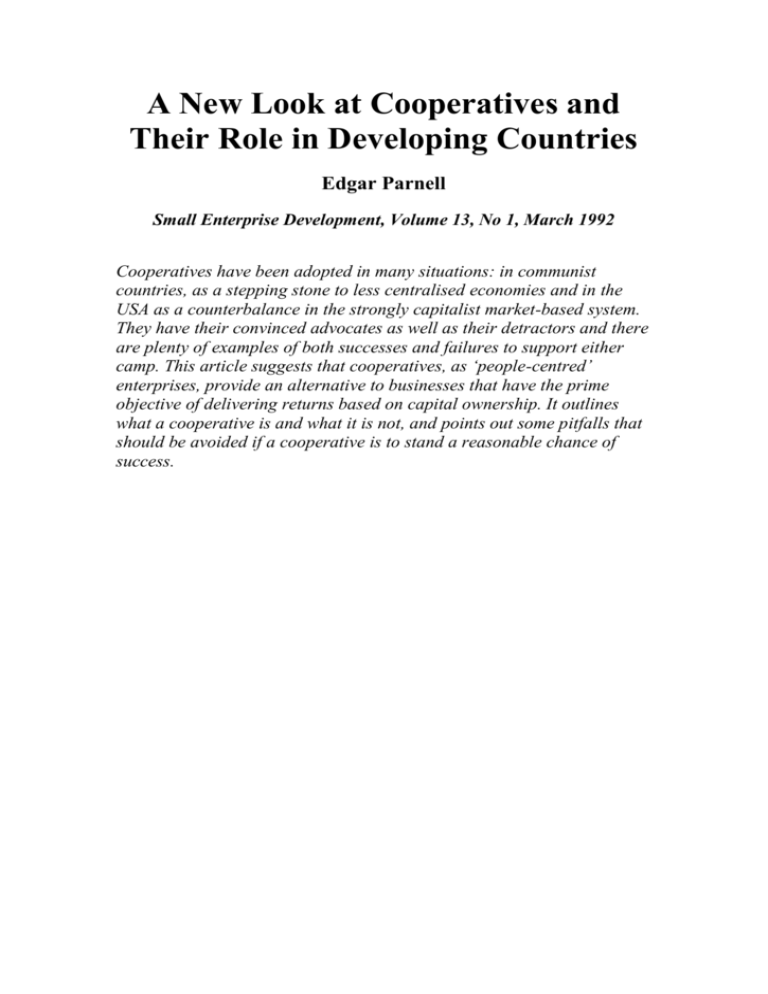A New Look at Cooperatives and Their Role in Developing Countries
advertisement

A New Look at Cooperatives and Their Role in Developing Countries Edgar Parnell Small Enterprise Development, Volume 13, No 1, March 1992 Cooperatives have been adopted in many situations: in communist countries, as a stepping stone to less centralised economies and in the USA as a counterbalance in the strongly capitalist market-based system. They have their convinced advocates as well as their detractors and there are plenty of examples of both successes and failures to support either camp. This article suggests that cooperatives, as ‘people-centred’ enterprises, provide an alternative to businesses that have the prime objective of delivering returns based on capital ownership. It outlines what a cooperative is and what it is not, and points out some pitfalls that should be avoided if a cooperative is to stand a reasonable chance of success. A New Look at Cooperatives and Their Role in Developing Countries Edgar Parnell Small Enterprise Development, Volume 13, No 1, March 1992 Cooperatives – there can be few other words in the vocabulary of international development that are as misused, misunderstood and evoke such strong feelings as this. Ever since the concept of ‘development’ evolved as an activity that might be stimulated by external intervention, cooperatives have been seen as a vehicle of great potential, and for over two centuries those interested in improving the lives of the less fortunate have advocated their use as a means of achieving development aims. From the social reformers of Europe in the nineteenth century, through to the leaders of the independent states established as the old colonial empires were dismantled, cooperatives have been seen as a means of uplifting the less well-off citizens. Communists have sought to use cooperatives as a stepping stone towards their now discredited new order, while at the same time the fiercely capitalist systems of North America have used them to bring about a balance in the market-place – particularly in rural areas. Many are enthusiastic about the development potential cooperatives offer. It is not difficult to understand how those who have wanted to see an acceleration in the development process have alighted upon the cooperative concept. After all, many have witnessed the success of cooperatives and are justifiably enthusiastic about the development potential they offer, not only in terms of economic advancement but also the improved capability of the individuals involved. Unfortunately the desire to extend the benefits of cooperation to larger numbers has led to the adoption of many ill-conceived schemes, which have sought to force the pace of cooperative development – usually with counter-productive results. The personal experiences of those trying to promote the cause of international development, not surprisingly colours their view as to the value of cooperatives in the development process. Neither the over-enthusiastic nor the negative approach to the use of cooperatives, however, is likely to advance the cause of sustainable human development. Many so-called cooperatives have been state-operated or have been entirely driven by external development agents. One of the greatest underlying problems associated with the use of cooperatives in the development process is that many development workers fail properly to understand the special nature of this form of enterprise. In general far too much emphasis has been placed upon the organisational model and too little upon cooperative objectives. Schemes for the development of cooperatives have frequently focused upon building institutions which are models of democracy or, at the other extreme, simply a means for the state to deliver services. Many so-called cooperatives were never correctly formed as such, being either organs of the state or driven by external development agents: vital elements of self-help and ownership of the cooperative were never an option for the members. The existence of organisations called ‘cooperatives’ which have been deployed as the instruments of command economies in many parts of the world has devalued an important mechanism; as have the idealists who have peddled the view that cooperatives are only of value if they are small and embrace an absolutely pure democratic structure. The objectives of an outside development agent should not be used to test the value of a cooperative (whether it be government or a nongovernmental organisation). The objectives of every cooperative can only properly be set out in terms of benefits to members, and it is only against such objectives that their success or failure can be measured. The role of businesses which are ‘person-centred’ rather than solely ‘investor-centred’ has to be important in developing countries. In a world that has now almost totally abandoned the idea that the state can successfully take on the task of running economic enterprises, the cooperative can perhaps now be viewed in a realistic way as a viable form of business. Once the concept of the market-place is accepted, then the options in terms of the forms of organisations that can operate within the market are limited. If we are to rely only on individual entrepreneurship and investor-driven businesses, then the options are too limiting. The concept of a business which is a group enterprise and has objectives other than primarily to deliver returns based on capital ownership is one that is essential to the existence of a balanced economic system. The role of businesses which are in fact ‘person-centred’ rather than solely ‘investor-centred’ has to be even more in any developing country. The acceptance of cooperatives as an important model of people-centred business will be a big step forward in achieving their real potential in the development process. The role which such businesses have played in the development of all progressive market economies is evidence of their significance. This model of a people-centred enterprise has found expression not only in a wide range of cooperatives but also in the form of building societies, associations, mutual organisations, credit unions, and so on. The people-centred enterprise is particularly valuable in correcting imbalances within the market-place, developing and sustaining local economies, mobilising local capital, meeting the need for businesses with longer term objectives such as sustainability and environmental considerations, and which can contribute towards creating employment and maintaining local control over resources. All of these features which are needed for the achievement of real development aims, and which cannot be met solely by investor-driven enterprises. Any approach to developing cooperatives needs to be made outside the context of any political or other ideology, and needs to be based on the simple assumption that there are many situations in which by taking joint action individuals can achieve benefits, both to themselves and to a wider community, which would otherwise not be achievable. This kind of approach is difficult enough to have accepted in any situation, and is doubly difficult in the frame of any developing country. People- centred enterprises are relatively easy targets to hijack by special interest groups, ranging from ambitious politicians to rural elites, and from enthusiastic nongovernmental organisations (NGOs) to the paid managers of the business. Any approach to developing cooperatives needs to be made outside the context of any political or other ideology In a short article of this nature it is not appropriate to try to detail the evidence in terms of the successes and failures of various approaches to cooperative development. Nevertheless, there is ample evidence available from many countries which confirms that there is a need for some kind of ‘watch-dog’ to prevent the worst forms of exploitation of those would-be members of people-centred enterprises, particularly in developing countries. This can be the function of the state, but it must itself be subject to limitations. Where policies are adopted to promote such enterprises actively then these functions ought to be completely separated from the watch-dog role, they cannot be carried out by bureaucrats or administrators. Cooperatives and other forms of people-centred enterprises must first and foremost be treated as business enterprises, and they can only be properly assisted by individuals who understand this. True, they are a special form of business and are shaped by their objectives: they are not a simple form of enterprise but more complex than many imagine. Those charged with the task of providing development support should be properly and adequately trained, not only in essential business skills, but in the management systems which are needed if they are to be successful. Those who provide support should be properly trained in essential business skills and in management systems. At the very least anyone involved with the support and development of people-centred enterprises needs to have grasped the essential characteristics of this form of business. These may be summarised as follows. The people-centred business: Must have objectives which can be clearly expressed in terms of benefits to its members (who may be individuals, other cooperatives or other business entities); Operates within the market system; Distributes benefits to members primarily on the basis of the use of the services provided, rather than on the basis of investment in the business; Provides share in the control of the enterprise based upon the individual rather than upon the level of investment; Is not state controlled; Is not a charity; and Is not a cartel or a contrived monopoly. Clearly the strongest and surest development of such businesses comes from those built slowly and entirely with the resources of the base membership, responding to needs through a totally democratic system of government. There are situations where there is a strong argument, however, to establish a cooperative when this cannot realistically be expected to develop solely from grass-root initiatives. There are sound examples which demonstrate that it is possible to establish such businesses using a form of ‘top-down’ approach. The world is littered with examples, however, where such attempts have resulted in conspicuous failure. It is important if such approaches are to work to understand fully the process which is being embarked upon. The intention must be absolutely clear and requires that a realistic timetable and plan be established. The process of development must build on the transformation from a ‘trusteeship’ model to a cooperative model if that is what is intended. Many people-centred businesses never progress beyond this trusteeship model and some would maintain that this is of no consequence provided that the business achieves its objectives in terms of delivering benefits to the membership. On the other hand, most with long experience of such enterprises are aware that even the most benevolent of dictatorships has great difficulty in meeting the real expectations of its people. In taking a new look at cooperatives and other similar forms of group enterprise, a new vantage point is needed, and the people-centred business concept can provide this. A great deal of rethinking is necessary on the part of many of those involved in international development. Even those who are already convinced that successful economic enterprises are a prerequisite to real and sustainable development may need to reappraise their views about the role of such enterprises, particularly within the process of economic restructuring. Further Information Edgar Parnell is the Director of the Plunkett Foundation, http://www.plunkett.co.uk which is involved in the provision of consultancy and training services to cooperatives and other people-centred businesses, and is also responsible for directing a number of development projects in Third World countries. Small Enterprise Development Journal (ISSN 0957 – 1329) is published by Intermediate Technology Publications, 103-105 Southampton Row, London, UK.






